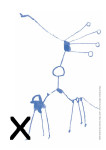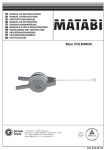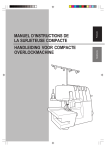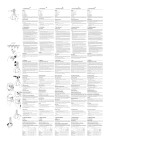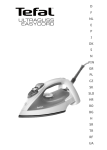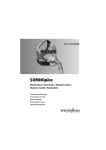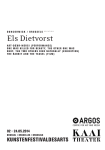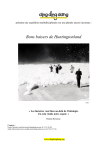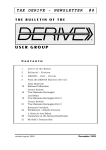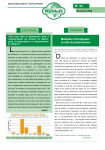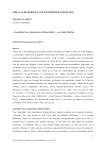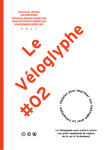Download THE BALLAD OF RICKY AND RONNY – A POP OPERA
Transcript
4, 5, 6, 10, 11, 12, 13/06/2009 – 20:30 – Kaaistudio’s première | 70 min. meet the artists after the performance on June 5th (interview by Marianne Van Kerkhoven) Fumiyo Ikeda / Tim Etchells [Brussels/Sheffield] in pieces Regie & tekst / Mise en scène & texte / Direction & Text Tim Etchells Creatie & performance / Création & jeu / Creation & Performance Fumiyo Ikeda Regieassistente / Assistante de mise en scène / Assistant Director Sara Jansen Lichtontwerp / Eclairages / Lighting Nigel Edwards Decor / Décor / Set Richard Lowdon Kostuums / Costumes Ann Weckx Techniek / Technique / Technician (Kaaitheater) Peter Fol Productieleiding / Coordination de la production / Production Management (Rosas) Hanne Van Waeyenberge Muziekadvies / Conseiller musical / Musical Advisor George van Dam Foto’s / Photos Herman Sorgeloos Productie / Production Rosas Coproductie / Coproduction / Co-production Kaaitheater (Brussels), Sadler’s Wells (London), PACT Zollverein (Essen), Théâtre Garonne (Toulouse), Festival d’Automne à Paris (Paris), Théâtre de la Bastille (Paris) Met de steun van / Avec le soutien de / With support from The British Council Met dank aan / Rermerciements / Thanks to Anne Teresa De Keersmaeker, Guy Gypens, Eileen Evans & Gareth James (Forced Entertainment), Anne-Catherine Kunz, Jitske Vandenbussche The British Council has been promoting the work of Tim Etchells, Artistic Director of Forced Entertainment for over twenty years. Tim has had a significant impact on the development of British experimental theatre, with his works often exploring the mechanics of the live event by challenging the conventions and expectations associated with theatrical performance. His desire to keep creating exciting and new encounters with audiences has made him one of the most influential UK artists working today. The British Council is delighted to support his latest project, in pieces, a collaboration with Fumiyo Ikeda, who joined Anne Teresa De Keersmaeker’s Rosas dance company in 1983 and has since performed in most of its major works. In 2007 her impressive career took another turn when she started to create own work together with other artists. Fumiyo shares Tim Etchells’ desire to explore new directions. This resulted in an exciting challenge, in pieces. [NL] Surfen op de golven van de tijdelijkheid en voorlopigheid in pieces is het resultaat van een samenwerking tussen danseres Fumiyo Ikeda en regisseur en auteur Tim Etchells. Fumiyo Ikeda danst al ruim 25 jaar bij Rosas en begon de afgelopen jaren aan een nieuw traject in haar oeuvre: een serie samenwerkingen met andere regisseurs, choreografen en performers. Zij wil niet zozeer een ‘podiumkameleon’ zijn die alle stijlen aankan, maar trekt andere artistieke universa binnen in haar eigen wereld. In 2007 maakt zij het rauwe Nine finger met Benjamin Verdonck en Alain Platel, en nu is er in pieces, een solo in samenwerking met Tim Etchells, artistiek leider van het Britse Forced Entertainment, een gezelschap dat ook al zo’n 25 jaar aan de voorhoede van de podiumkunsten staat. Etchells en Ikeda hebben vaak op dezelfde podia en festivals gestaan, maar het was de suggestie van Guy Gypens van het Kaaitheater die hen uiteindelijk samenbracht voor een project. Net als Ikeda wil ook Tim Etchells nieuwe richtingen inslaan. Voor hem past deze samenwerking in een reeks projecten die hij onafhankelijk van zijn gezelschap maakt. Zo schreef hij de roman The Broken World (2008), is hij actief in de beeldende kunst, en schreef en regisseerde hij That Night Follows Day (2007), een voorstelling voor zestien kinderen (voor Victoria, nu CAMPO) en Sight is the Sense... (2008) voor de Amerikaanse acteur Jim Fletcher. in pieces begon als een open onderzoek, een reis doorheen ideeën, losse woorden, teksten, improvisaties, bewegingen, lijstjes, opdrachten enzovoort. De voorstelling biedt microscopische en persoonlijke perspectieven op thema’s als het geheugen en het niets, verhalen en structuren, emoties en identiteit. Ze vertrekt van de verwondering over al die verschillende thema’s en hun onderlinge verbanden en benadert hen niet als abstracte ideeën, maar brengt ze als concrete gebeurtenissen en tekst op de scène. We stellen ons het geheugen vaak voor als een netjes geordend archief dat mits de juiste zoekopdrachten doorzocht kan worden, en waarbij elementen die we minder belangrijk achten doorheen de tijd vervagen en vervangen worden door nieuwe ervaringen. Bij nader inzien verloopt het hele proces van memoriseren, opslaan en terughalen echter veel onvoorspelbaarder. Het is een proces op de grens van het bewuste en het onbewuste. Onze identiteit is een gebeuren, een wankele constructie van herinneringen, verhalen, emoties en hulpconstructies. Wat je vergeet, wat mislukt, wat ontsnapt aan je greep is net zo belangrijk als je herinneringen en je verwezenlijkingen. De taal is maar een onvolmaakt en dubbelzinnig hulpmiddel. Je hebt geen handleiding voor jezelf, we zijn voortdurend in de weer om onszelf samen te vatten voor onszelf en de anderen. Met vaak tragische of komische gevolgen… In de voorstelling staat Fumiyo Ikeda alleen op scène en denkt zij terug, al dansend en al sprekend. Ze maakt lijsten en structuren van herinneringen, persoonlijke en algemene, fysieke en mentale, triviale en cruciale, recente en oude. Ikeda en Etchells zetten in op de openheid van het geheugen. De flexibiliteit waarmee gegevens geordend en herordend worden. De aanstekelijkheid van het zich herinneren en de kettingreacties die van de ene herinnering naar de andere voeren, van de ene persoon naar de andere, van de performer naar de toeschouwer. Beweging en tekst spelen de bal naar elkaar door. Het geheugen inzetten betekent wegen vinden om toegang te krijgen tot zijn inhoud, structuren bedenken om tijdelijk controle te krijgen over betekenissen en processen. Manieren om de chaos van de werkelijkheid, die zich weerspiegelt in de chaos van het geheugen en de veelheid aan mogelijke perspectieven op dezelfde gebeurtenis, tijdelijk te sturen. in pieces surft op de golven van de tijdelijkheid en voorlopigheid. Het is geen portret, maar een schets van mogelijkheden, een uitnodiging om mee te herinneren, om je eigen verhalen, gedachten en betekenissen te enten op die van Ikeda en Etchells. in pieces wil een poreuze voorstelling zijn: stevig en tastbaar, en tegelijk doorlaatbaar. Een stuk dat ademt en aanspoort om mee te ademen. Steven De Belder juni 2009 [FR] Surfer sur la vague du provisoire in pieces est une collaboration entre la danseuse Fumiyo Ikeda et le metteur en scène et auteur Tim Etchells. Fumiyo Ikeda danse depuis 25 ans déjà avec la compagnie Rosas. Au cours des dernières années, elle a entamé un parcours personnel consistant en une série de collaborations avec d’autres metteurs en scène, chorégraphes et performeurs. Elle n’aspire pas tant à être un caméléon de la scène, capable d’adopter tous les styles, mais souhaite plutôt intégrer d’autres univers artistiques dans le sien. En 2007, elle a créé le spectacle assez cru Nine finger avec Benjamin Verdonck et Alain Platel. À présent, il y a in pieces, un solo créé en collaboration avec Tim Etchells, le directeur artistique du collectif britannique Forced Entertainment, également à l’avant-garde des arts de la scène depuis quelque 25 ans. Etchells et Ikeda ont souvent été à l’affiche des mêmes scènes et festivals, mais c’est la suggestion de Guy Gypens du Kaaitheater qui les a finalement réunis pour un projet commun. À l’instar d’Ikeda, Etchells souhaite également emprunter de nouvelles voies. Pour lui, cette collaboration s’inscrit dans une série de projets indépendants de la compagnie qu’il dirige. Ainsi, il a écrit un roman, The Broken World (2008), s’essaie aux arts plastiques, et a écrit et mis en scène That Night Follows Day (2007), un spectacle pour seize enfants produit par Victoria (CAMPO), et Sight is the Sense…, une production destinée au jeune comédien américain Jim Fletcher. in pieces a commencé comme une recherche ouverte, un voyage à travers des idées, des mots, des textes, des improvisations, des listes, des tâches, etc. Le spectacle offre des perspectives microscopiques et personnelles sur des thèmes comme la mémoire et le néant, les histoires et les structures, les émotions et l’identité. in pieces part de l’étonnement que suscitent tous ces thèmes différents et de leurs liens mutuels. Le spectacle ne les aborde pas comme des idées abstraites, mais les porte à la scène en tant que texte et événements concrets. Nous imaginons souvent notre mémoire comme des archives bien organisées que l’on peut passer au crible, pour peu que l’on actionne la bonne commande de recherche et puisse remplacer les éléments dont l’importance s’est, à nos yeux, amenuisée au fil du temps par des expériences nouvelles. Tout bien considéré, le processus de mémorisation, d’emmagasinement et de recouvrement est bien plus imprévisible : celui-ci se déroule à la limite du conscient et de l’inconscient. Notre identité est un déroulement, une construction fragile de souvenirs, de récits, d’émotions et de structures de secours. Ce que l’on oublie, ce qui rate, ce qui nous échappe est aussi important que nos souvenirs ou nos réalisations. Le langage n’est qu’un outil imparfait et ambigu. On ne dispose pas de mode d’emploi de soi. Nous n’avons de cesse de faire la synthèse de notre propre personne, tant pour nous-mêmes que pour les autres, avec des effets souvent tragiques ou comiques… Dans in pieces, Fumiyo Ikeda est seule en scène et se souvient, tout en dansant et en parlant. Elle établit des listes et des structures de souvenirs, personnels et généraux, physiques et mentaux, triviaux et cruciaux, récents et anciens. Ikeda et Etchells tablent sur l’ouverture de la mémoire et la flexibilité avec laquelle les informations sont ordonnées et réordonnées : la contagion du souvenir et les réactions en chaîne qui mènent d’un souvenir à l’autre, d’une personne à l’autre, d’un performeur à l’autre. Mouvement et texte se passent la balle. Engager la mémoire signifie trouver des chemins qui permettent d’avoir accès à son contenu, imaginer des structures pour obtenir le contrôle provisoire des significations et des processus, trouver des manières de diriger, temporairement, le chaos de la réalité qui se reflète dans le chaos de la mémoire et dans la multiplicité des perspectives potentielles sur le même événement. in pieces surfe sur la vague du provisoire. Il ne s’agit pas d’un portrait, mais d’une ébauche de possibilités, une invitation à se souvenir, à greffer le sens de nos propres histoires et pensées sur celles d’Ikeda et Etchells. in pieces aspire à être un spectacle poreux : solide et tangible, et à la fois perméable. Une pièce qui respire et encourage à respirer. Steven De Belder juin 2009 [EN] Surfing on the waves of the transient and temporary in pieces is a collaboration between dancer Fumiyo Ikeda and director, author and artist Tim Etchells. Fumiyo Ikeda has danced with Rosas for at least 25 years and in the last few years has developed a new direction in her work, a series of performances made in cooperation with other directors, choreographers and performers. It is not so much that she wants to be a performing chameleon capable of taking on any style, rather that she draws other artistic worlds into her own. In 2007 she made the raw Nine finger with Benjamin Verdonck and Alain Platel, and now there is in pieces, a solo created together with Tim Etchells, artistic director of the British company Forced Entertainment, which has also been at the vanguard of the performing arts for around 25 years. Etchells and Ikeda have often appeared on the same stages and festivals, but it was not until Kaaitheater director Guy Gypens suggested it that they joined forces. Like Ikeda, Etchells also wants to explore new directions. This collaboration fits into a strand of projects outside of the company he leads. He published a novel called The Broken World (2008), works in the context of visual arts and wrote and directed That Night Follows Day (2007), a performance by sixteen children for Victoria (now CAMPO), and Sight is the Sense... (2008) for American actor Jim Fletcher. in pieces started as an open enquiry, a journey of ideas, individual words, pieces of writing, improvisation, movements, lists, tasks and so on. The performance presents microscopic and personal perspectives on such subjects as memory and nothingness, stories and structures, emotions and identity. in pieces starts from a straightforward wonder about these themes and their interconnections exploring them not as abstract ideas but as concrete events and texts presented on stage. We often imagine our memory to be a neatly ordered archive that, given the right instructions, can be searched, and where elements we consider less important fade with time, to be replaced by new experiences. However, on closer examination, the whole process of memorising, storage and retrieval turns out to be much more unpredictable. It is a process that takes place on the border between the conscious and the unconscious. Our identity is an event, a shaky construction of recollections, stories, emotions and auxiliary constructions. What we forget, what fails or escapes our grasp is as important as our memories and achievements. Language is only an imperfect and ambiguous aid. We have no instruction manuals for ourselves, and we are constantly engaged in summarising ourselves for ourselves and others, often with tragic or comical consequences. In the performance, Fumiyo Ikeda is alone on stage and as she dances and speaks, she recollects. She draws up lists and structures of memories, personal and general, physical and mental, trivial and crucial, old and recent. Ikeda and Etchells zoom in on the openness of memory and the flexibility with which data are ordered and reordered. They explore the infectiousness of remembering and the chain reactions that lead from one memory to the next, from one person to another, from the performer to the spectator. Words and movement pass the ball back and forth to each other. Mobilising memory means finding ways of gaining access to its content, thinking up structures to gain temporary control of meanings and processes, or ways of temporarily controlling the chaos of reality, which is reflected in the chaos of memory and the abundance of possible views on the same event. in pieces surfs on the waves of the transient and temporary. It is not a portrait, but a sketch of possibilities, an invitation to remember too, to project our own stories, thoughts and meanings onto those of Ikeda and Etchells. in pieces aims to be a porous performance: solid and tangible, yet at the same time permeable. A piece that breathes and urges us to breathe too. Steven De Belder June 2009




